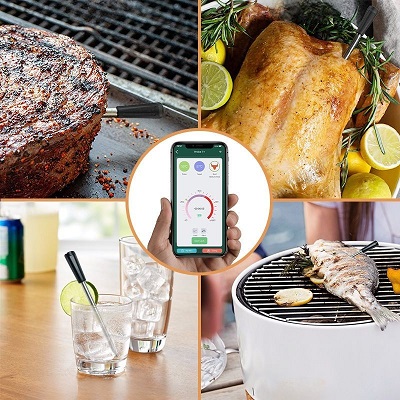The battery life of a wireless meat thermometer is a crucial consideration for cooks and grill enthusiasts who rely on this device to achieve perfectly cooked meat dishes. The longevity of the batteries affects the convenience, efficiency, and overall usability of the thermometer.
While the specific battery life may vary depending on the model and usage patterns, there are several factors that determine how long the batteries of a wireless meat thermometer typically last.

Factors
In this part, you will get the knowledge of factors that determine how long the batteries of a wireless thermometer are in detail.
1. Battery Type
The type of batteries used in a wireless meat thermometer significantly influences its battery life. Many thermometers use AA or AAA batteries, while some advanced models employ rechargeable lithium-ion batteries.
Alkaline batteries, like AA or AAA, generally have a longer life than standard zinc-carbon batteries.
2. Usage Frequency
The frequency of use is a critical factor in battery life. A wireless meat thermometer that sees frequent use, such as in a busy restaurant kitchen or during regular grilling sessions, may require battery replacement more often than one used less frequently in a home setting.
3. Screen and Display Usage
The display screen of a wireless meat thermometer can consume a significant amount of power, especially if it is a backlit or color display. Thermometers with larger screens or those that are frequently in use for extended periods may consume more power and, therefore, have a shorter battery life.
4. Wireless Range and Connectivity
Wireless connectivity, such as Bluetooth or Wi-Fi, enables the main unit to communicate with the probes. The range and strength of this wireless connection can impact battery life.
If the wireless signal is weak or the distance between the main unit and the probes is considerable, the battery may drain faster as the device tries to maintain the connection.
5. Probe Usage
In thermometers with multiple probes, each probe requires power to function properly. The number of probes in use and the duration of their use during cooking sessions can affect overall battery consumption.
6. Ambient Temperature
Extreme temperatures can impact battery life. Very hot or very cold environments can lead to decreased battery performance. For example, using a wireless meat thermometer in freezing temperatures may cause batteries to deplete faster.
7. Power-saving Features
Some wireless meat thermometers come equipped with power-saving features, such as automatic shut-off after a period of inactivity or energy-efficient display options. These features can extend battery life.
8. Battery Brand and Quality
The brand and quality of the batteries used can also influence their lifespan. High-quality and reputable battery brands often offer better performance and longer life compared to generic or lower-quality alternatives.
On average, wireless meat thermometers with regular AA or AAA batteries can last anywhere from 20 to 100 hours of continuous use. Thermometers with rechargeable lithium-ion batteries may provide longer battery life per charge, lasting anywhere from 40 to 200 hours, depending on usage and features.

Measures to maximize battery life
1. Turn off the thermometer when not in use to conserve power.
2. Replace batteries with fresh ones if the device starts to show signs of weak signals or erratic readings.
3. Store the thermometer in a cool and dry place when not in use to prevent battery drain due to extreme temperatures.
4. Utilize power-saving features, such as turning off the display when not actively monitoring the temperature.
Conclusion
The battery life of a wireless meat thermometer depends on various factors, including battery type, usage frequency, display usage, wireless connectivity, ambient temperature, probe usage, power-saving features, and battery quality.
By understanding these factors and adopting good practices, cooks and grill enthusiasts can make the most out of their wireless meat thermometers and ensure they have reliable power to create delicious and perfectly cooked meat dishes.
 Adair
Adair